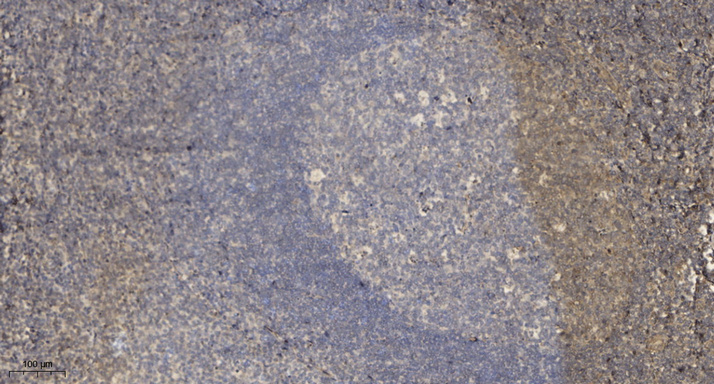Rad9 Polyclonal Antibody
- Catalog No.:YT3972
- Applications:IHC;IF;ELISA
- Reactivity:Human;Rat;Mouse;
- Target:
- Rad9
- Gene Name:
- RAD9A
- Protein Name:
- Cell cycle checkpoint control protein RAD9A
- Human Gene Id:
- 5883
- Human Swiss Prot No:
- Q96C41
- Immunogen:
- The antiserum was produced against synthesized peptide derived from human RAD9. AA range:257-306
- Specificity:
- Rad9 Polyclonal Antibody detects endogenous levels of Rad9 protein.
- Formulation:
- Liquid in PBS containing 50% glycerol, 0.5% BSA and 0.02% sodium azide.
- Source:
- Polyclonal, Rabbit,IgG
- Dilution:
- IHC 1:100 - 1:300. ELISA: 1:5000.. IF 1:50-200
- Purification:
- The antibody was affinity-purified from rabbit antiserum by affinity-chromatography using epitope-specific immunogen.
- Concentration:
- 1 mg/ml
- Storage Stability:
- -15°C to -25°C/1 year(Do not lower than -25°C)
- Other Name:
- RAD9A;Cell cycle checkpoint control protein RAD9A;hRAD9;DNA repair exonuclease rad9 homolog A
- Molecular Weight(Da):
- 43kD
- Background:
- catalytic activity:Exonucleolytic cleavage in the 3'- to 5'-direction to yield nucleoside 5'-phosphates.,function:Component of the 9-1-1 cell-cycle checkpoint response complex that plays a major role in DNA repair. The 9-1-1 complex is recruited to DNA lesion upon damage by the RAD17-replication factor C (RFC) clamp loader complex. Acts then as a sliding clamp platform on DNA for several proteins involved in long-patch base excision repair (LP-BER). The 9-1-1 complex stimulates DNA polymerase beta (POLB) activity by increasing its affinity for the 3'-OH end of the primer-template and stabilizes POLB to those sites where LP-BER proceeds; endonuclease FEN1 cleavage activity on substrates with double, nick, or gap flaps of distinct sequences and lengths; and DNA ligase I (LIG1) on long-patch base excision repair substrates. RAD9A possesses 3'->5' double stranded DNA exonuclease activity. Its phosphorylation by PRKCD may be required for the formation of the 9-1-1 complex.,PTM:Constitutively phosphorylated on serine and threonine amino acids in absence of DNA damage. Hyperphosphorylated by PRKCD and ABL1 upon DNA damage. Its phosphorylation by PRKCD may be required for the formation of the 9-1-1 complex.,similarity:Belongs to the rad9 family.,subunit:Component of the toroidal 9-1-1 (RAD9-RAD1-HUS1) complex, composed of RAD9A, RAD1 and HUS1. The 9-1-1 complex associates with LIG1, POLB, FEN1, RAD17, HDAC1, RPA1 and RPA2. The 9-1-1 complex associates with the RAD17-RFC complex. RAD9A interacts with BCL2L1, FEN1, PRKCD, RAD9B, HUS1, RAD1, ABL1, RPA1, ATAD5 and RPA2.,
- Function:
- catalytic activity:Exonucleolytic cleavage in the 3'- to 5'-direction to yield nucleoside 5'-phosphates.,function:Component of the 9-1-1 cell-cycle checkpoint response complex that plays a major role in DNA repair. The 9-1-1 complex is recruited to DNA lesion upon damage by the RAD17-replication factor C (RFC) clamp loader complex. Acts then as a sliding clamp platform on DNA for several proteins involved in long-patch base excision repair (LP-BER). The 9-1-1 complex stimulates DNA polymerase beta (POLB) activity by increasing its affinity for the 3'-OH end of the primer-template and stabilizes POLB to those sites where LP-BER proceeds; endonuclease FEN1 cleavage activity on substrates with double, nick, or gap flaps of distinct sequences and lengths; and DNA ligase I (LIG1) on long-patch base excision repair substrates. RAD9A possesses 3'->5' double stranded DNA exonuclease activity. It
- June 19-2018
- WESTERN IMMUNOBLOTTING PROTOCOL
- June 19-2018
- IMMUNOHISTOCHEMISTRY-PARAFFIN PROTOCOL
- June 19-2018
- IMMUNOFLUORESCENCE PROTOCOL
- September 08-2020
- FLOW-CYTOMEYRT-PROTOCOL
- May 20-2022
- Cell-Based ELISA│解您多样本WB检测之困扰
- July 13-2018
- CELL-BASED-ELISA-PROTOCOL-FOR-ACETYL-PROTEIN
- July 13-2018
- CELL-BASED-ELISA-PROTOCOL-FOR-PHOSPHO-PROTEIN
- July 13-2018
- Antibody-FAQs
- Products Images

- Immunohistochemical analysis of paraffin-embedded human tonsil. 1, Antibody was diluted at 1:200(4° overnight). 2, Tris-EDTA,pH9.0 was used for antigen retrieval. 3,Secondary antibody was diluted at 1:200(room temperature, 30min).



